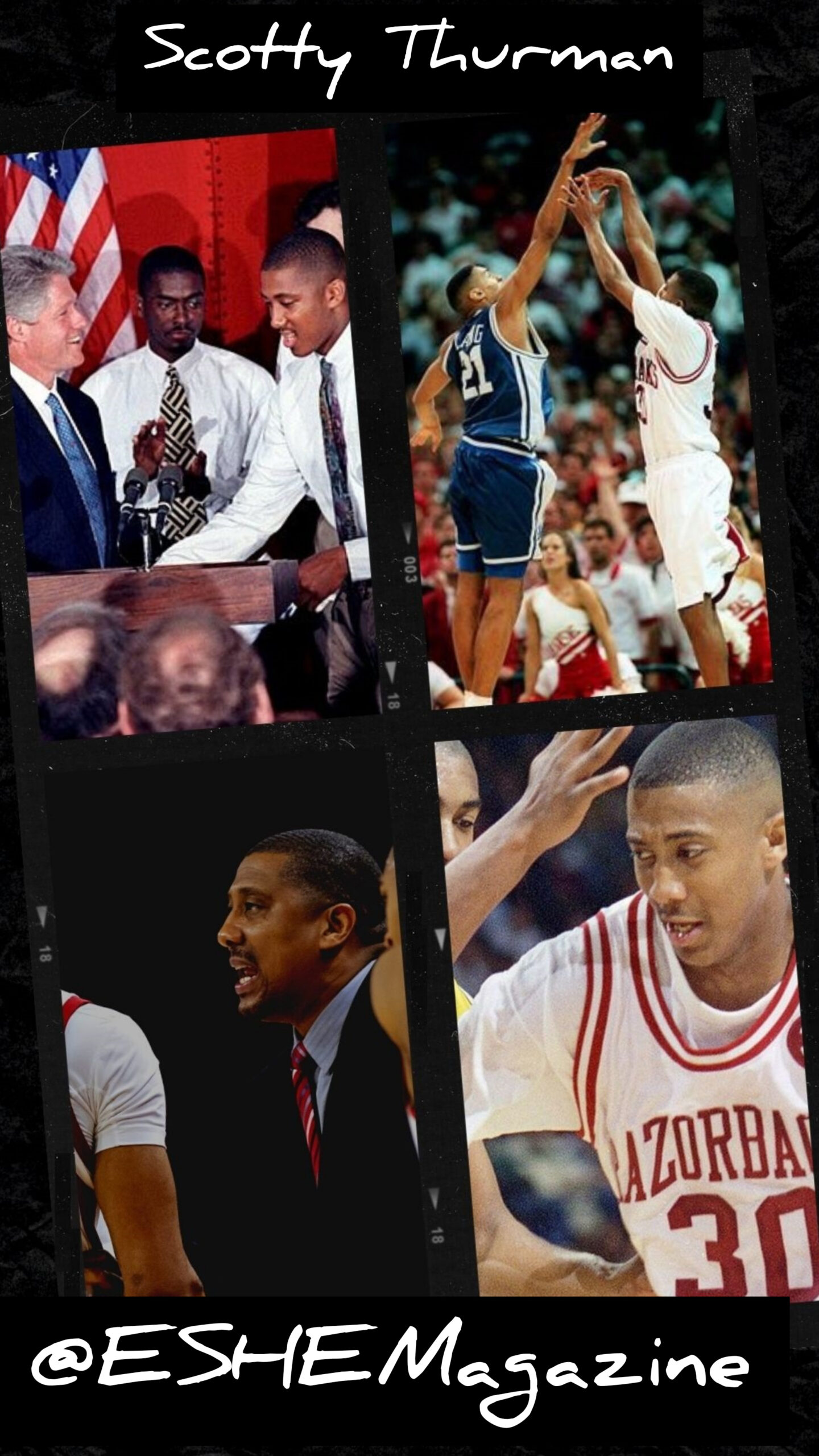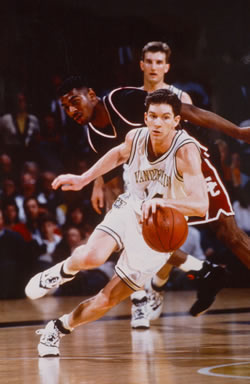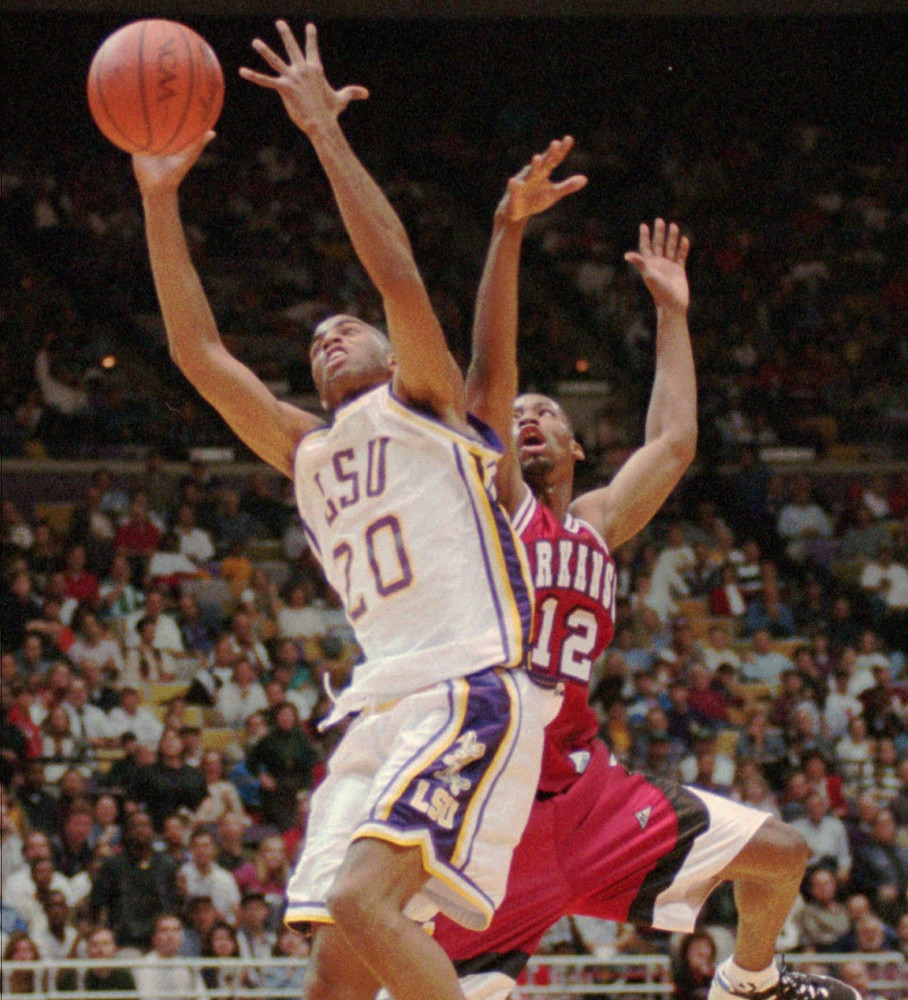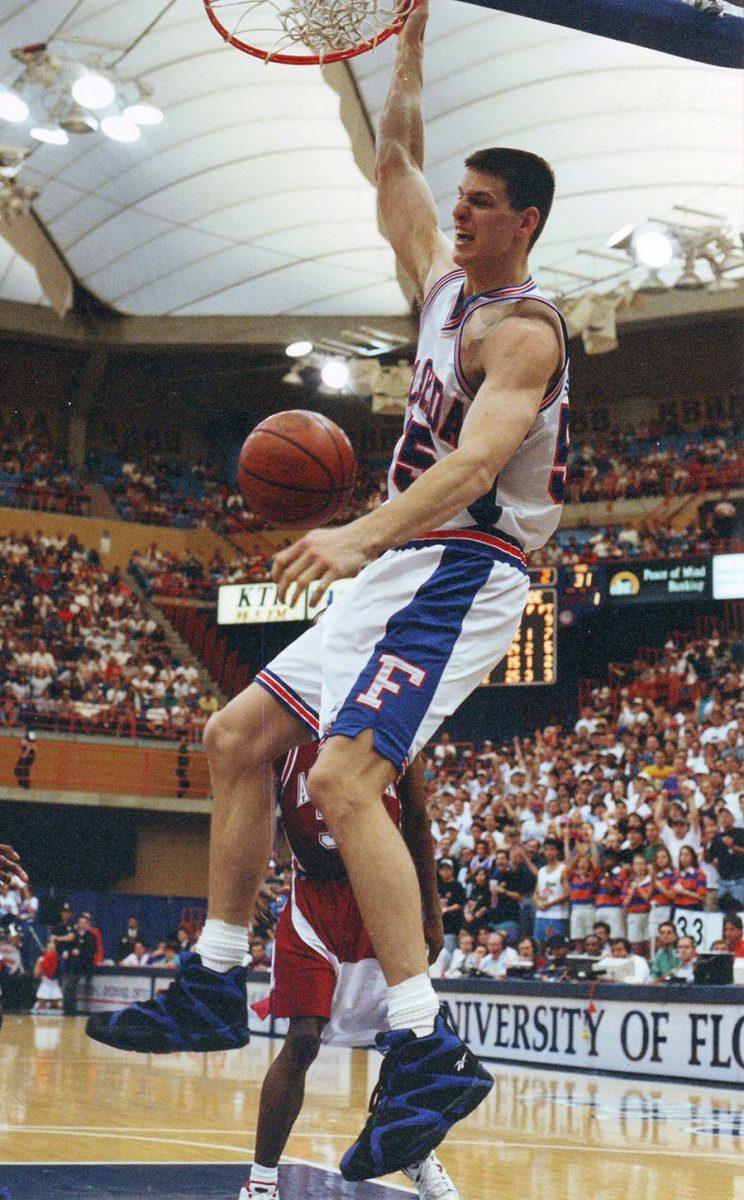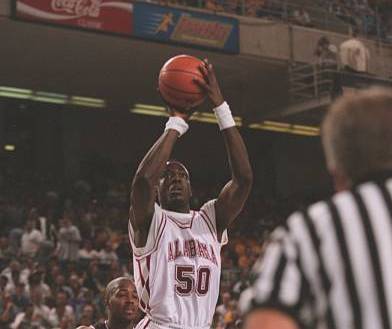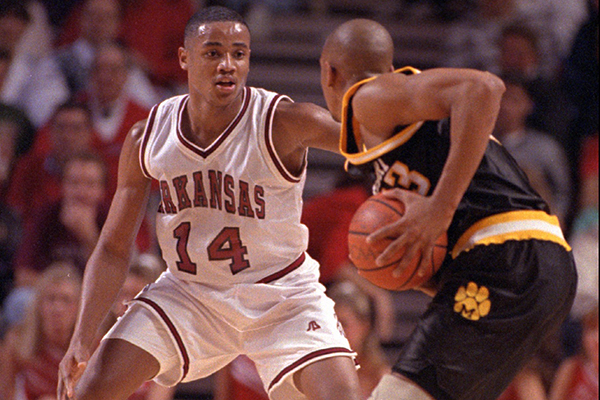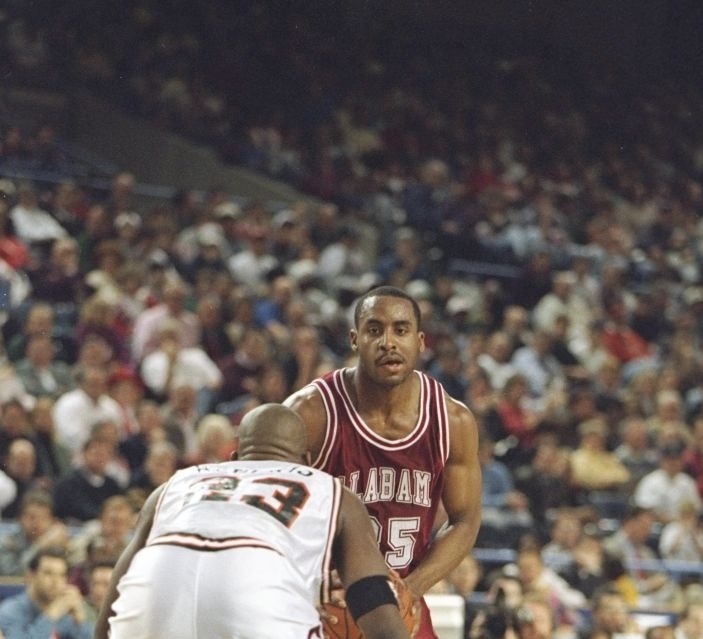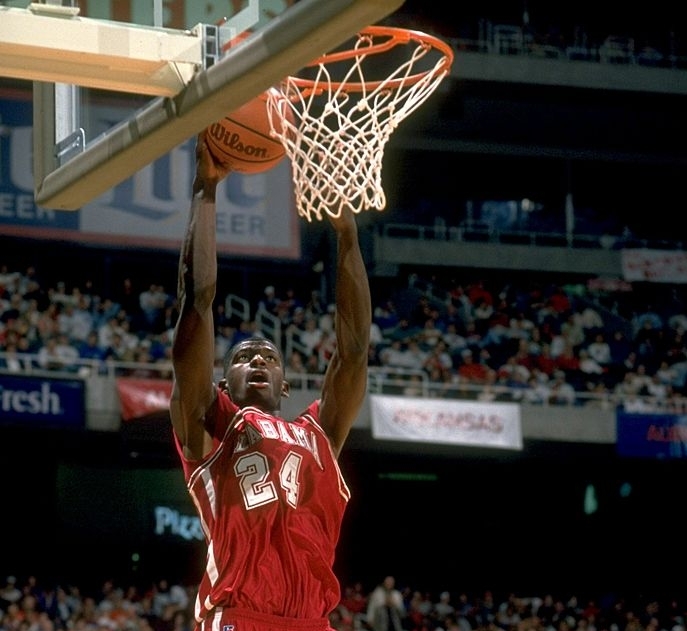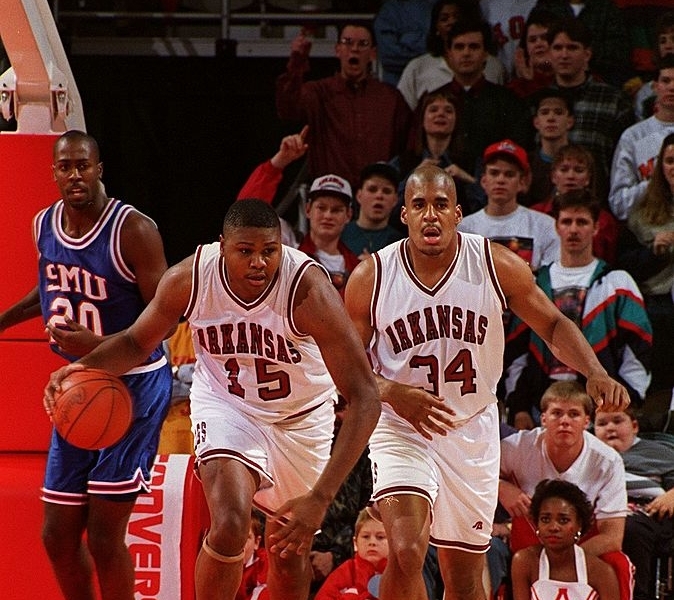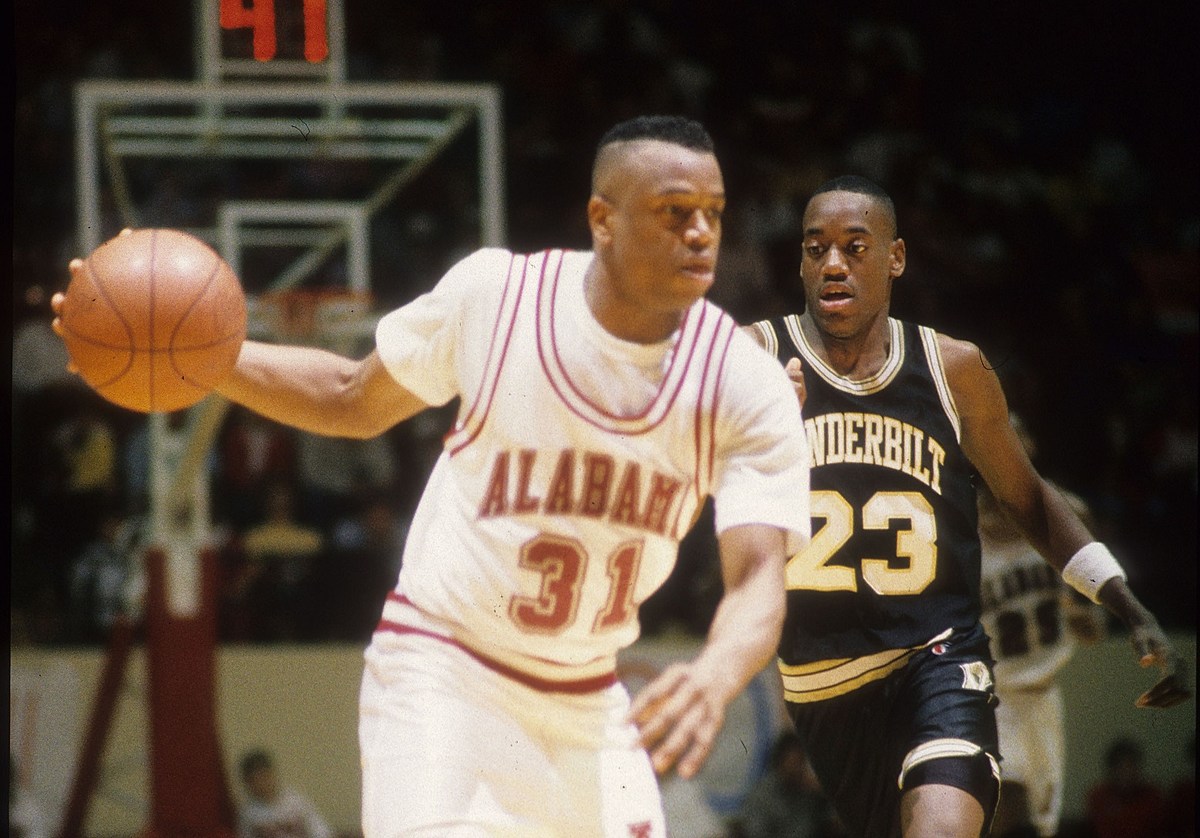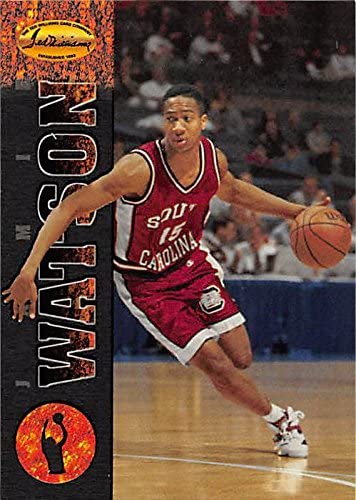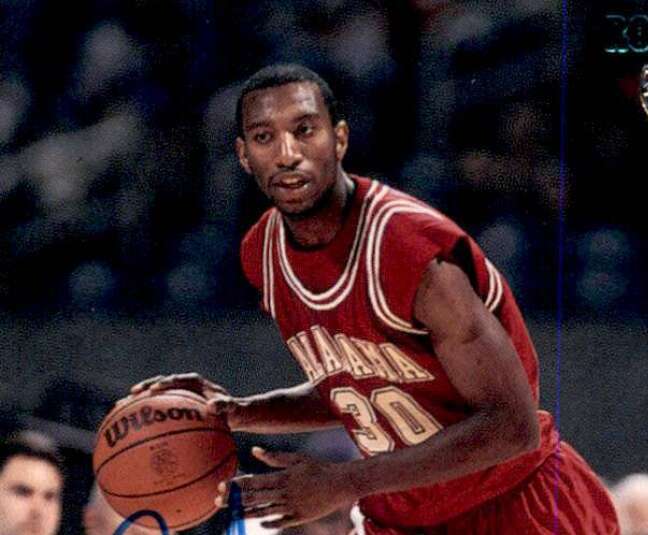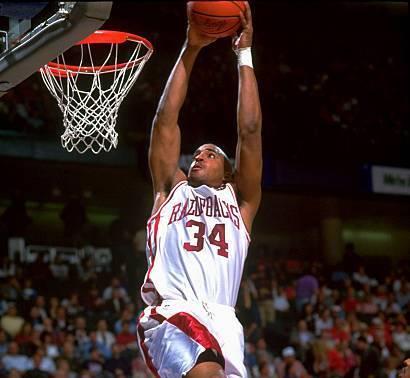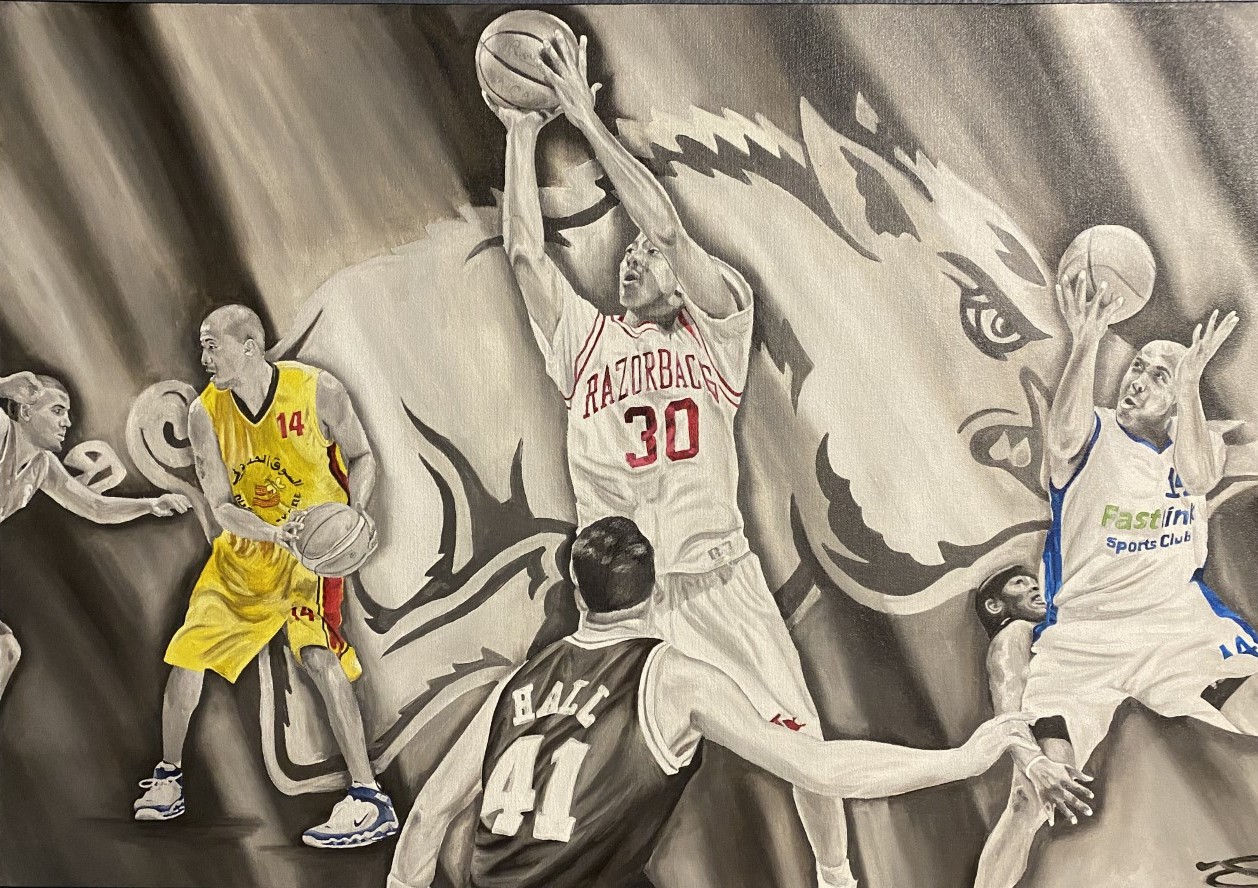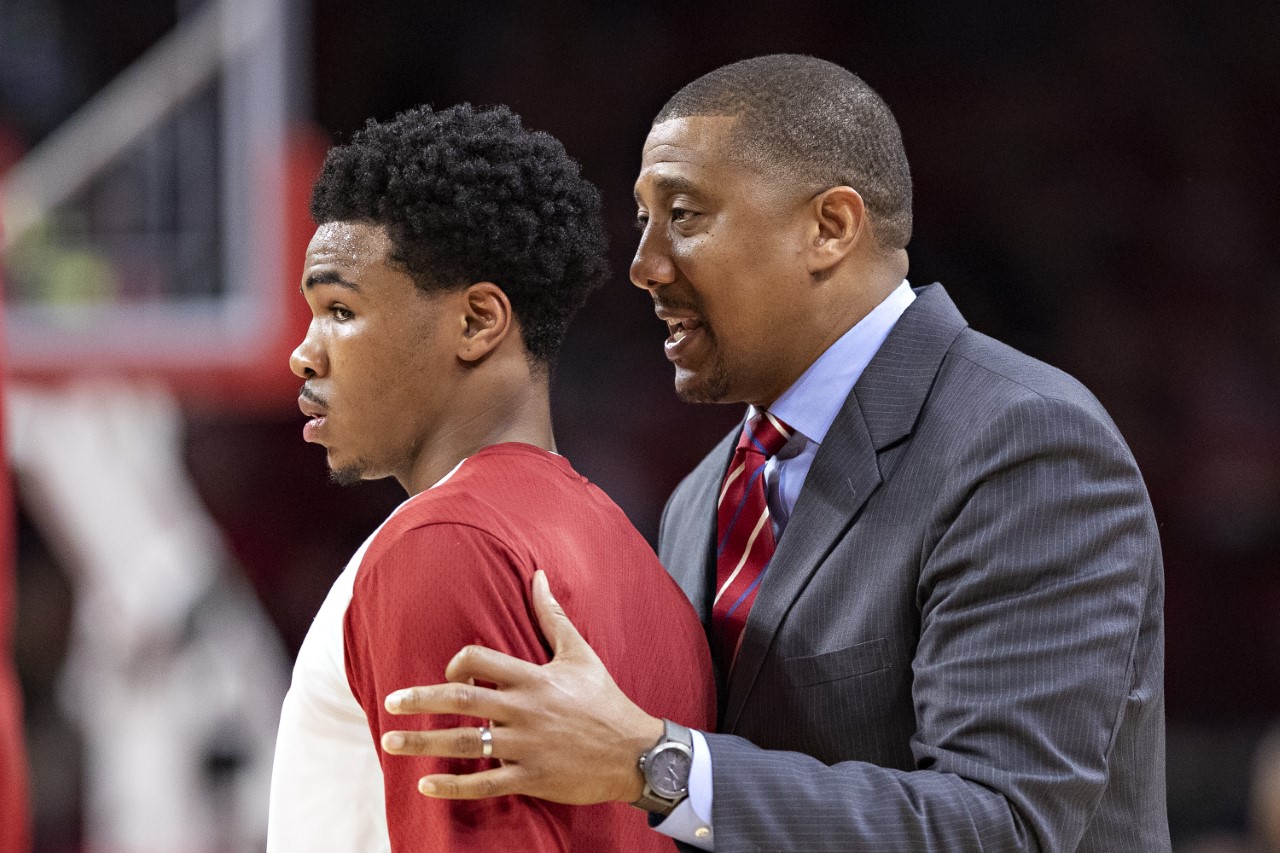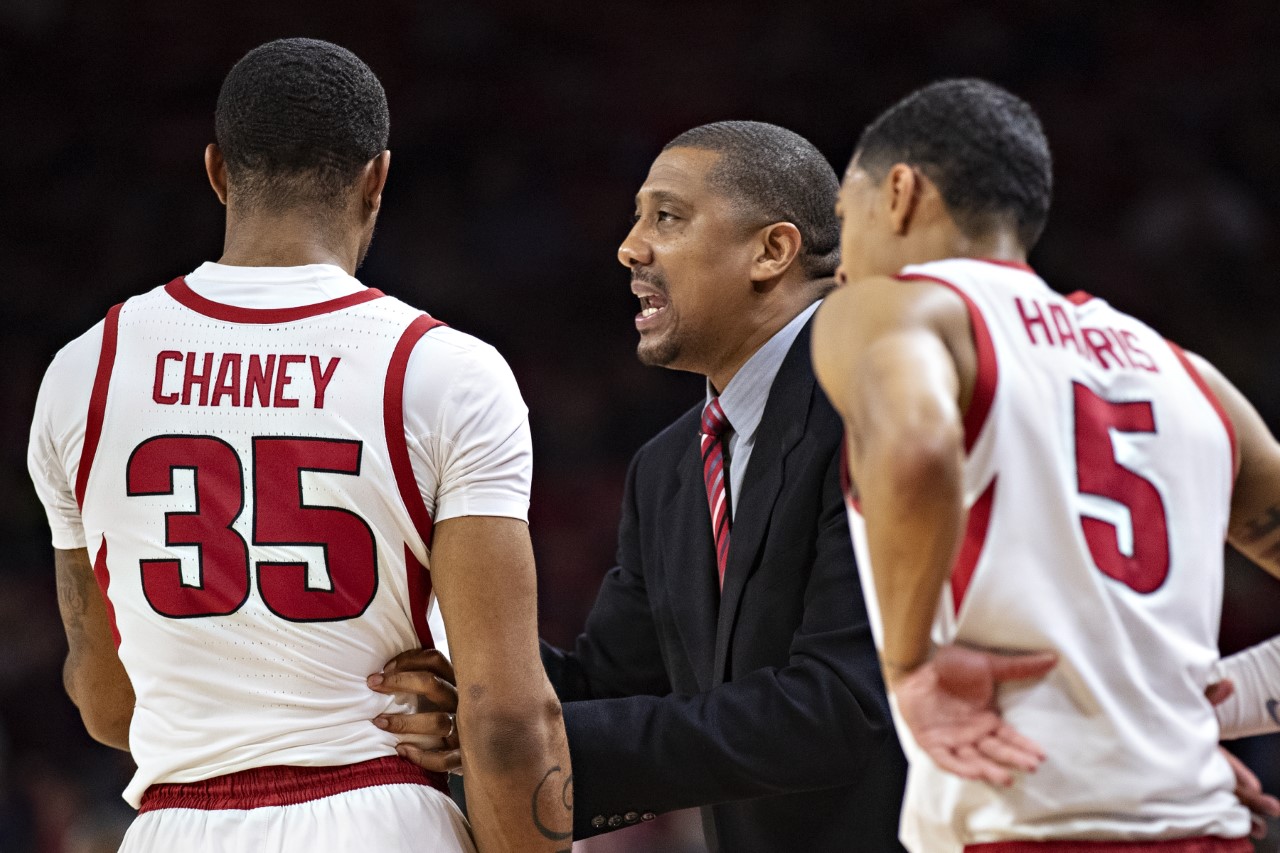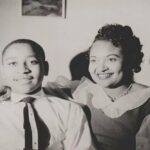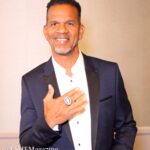By David Jordan Jr
For many, the goals and aspirations that initiate and create a life path towards success are very concrete and clear. The blueprint of hard work, belief, perseverance and faith enable a person to not only achieve but to excel at the highest levels. Arkansas Razorback legend, SEC and NCAA Legend Scotty Thurman is a man that has been able to achieve greatness in various aspects of his life. Hailing from Ruston, Louisiana, Thurman, in addition to being a standout basketball player was a scholar, a true definition of the term scholar-athlete. Choosing to play collegiate basketball at the University of Arkansas for the living legend and Hall Of Fame coach Nolan Richardson, Thurman would have a standout career in Fayetteville, winning many accolades for his excellence on the court in addition to his excellence in the classroom. In 1994 Thurman became a part of March Madness history when his shot against Duke in the NCAA title game helped Arkansas win its first and only National championship. Upon completing his playing career at the University of Arkansas in 1995, Thurman would play professionally in the NBA and internationally before coming full circle to coach at his alma mater and now coach and develop men on the high school level in Little Rock, Arkansas. Recently I talked to Scotty about his life, his basketball career, Coach Nolan Richardson and how he has been able to impact the development of young men as a coach both on and off the court.
David Jordan Jr: What Was your Childhood like growing up in Ruston, Louisiana and when did you get introduced to the game of basketball?
Scotty Thurman: Growing up in Ruston, I grew up the youngest of four. I had two older brothers and an older sister. We had pretty humble beginnings, not a rich family by any means. My mother was a social worker and she always had two jobs. My father was an offshore oil counter. He worked seven days on, seven days off. My childhood was a little different because my father was there seven days and then gone seven days. We kind of gravitated to sports. My grandfather and my mother made sure we were involved in things where we couldn’t veer off. I came into sports at a very young age. My father was an athlete as well, he played basketball at Grambling State University. I was introduced to basketball in the third/fourth grade. He used to have us fold up socks and shoot them in the clothes basket, so we always watched basketball and tried to play. In the fifth grade, he put a basket up in the backyard.
David Jordan Jr: You played at Ruston High School and on the AAU circuit during a time before social media, the internet, and hype machines were everywhere. You really had to earn your stripes through your hard work and play. Could you tell us about your high school and AAU experience?
Scotty Thurman: My experience was very different than most kids nowadays because they don’t really play outside. They never really go outside and get beat up by the older guys. I grew up playing outside against the older guys, so playing high school for me was so much easier. My older brother was three years older than me and he was probably the best player in the family, but due to other things, unforeseen things, and being involved in things that had nothing to do with academics and sports, his life went another route. He and his friends chastised me quite often and prepared me for playing on the AAU circuit, so when I played AAU, it was easy for me to play against my age group. I started playing at 13, I played my age group and I also played up with the 16U and then I played with the 13U, 14U, 15U and 16U. Getting the opportunity to play with my age group, I always went out and tried to dominate, but playing with the older guys kept me hungry. The competition was always fresh for me. That’s how I was able to develop into a good player.
David Jordan Jr: How did you end up at Arkansas? Especially at a time when you were in Louisiana, with Dale Brown and LSU were getting a lot of players that were within the area. What schools recruit you?
Scotty Thurman: I was recruited by a lot of different schools. One of the biggest things that helped me narrow my list down was that I wanted to play for an African American coach. I never had that opportunity in high school or AAU. Coach Richardson reminded me of my father in terms of discipline, in terms of having that fear factor of making you want to play hard, and not step out of bounds with behavior or uncharacteristic play. I was going to attend college at a time when I was just 17 years old, so I figured I needed someone to keep me in check. My top five was Arkansas, Oklahoma, Texas, Pittsburgh, and Stanford. I took my visit to OU and there were some crazy things going on. The guys that were my host left me stranded at party. At Pittsburgh, I had the opportunity to hang out with some nice guys but the biggest thing about Pitt was the distance from home and how cold it was. I was not used to that growing up in Louisiana. That caught me by surprise. When I went to Arkansas, I knew I wanted to have the opportunity to play, at least have the chance to compete to play. I was always told I was young and that I should go to Prep School. At that time, that was not that big of a thing, at least for the people in the south. I was hesitant to look outside the box. I had a relationship with Corliss. Arkansas had a black coach in Coach Richardson. It wasn’t too far from home, being only five and a half hours away, so my parents could see me play. All those things played a huge factor. Having someone like Corliss which I knew from playing AAU ball against. I didn’t take my visits to Texas and Stanford. I felt Standford was a bit too far, so my parents would not be able to attend many games. Texas was still in the Southwest Conference and I didn’t want to spend the rest of my adolescent life traveling only to Texas because if you think about it, before Arkansas went to the SEC, nearly every school they played against was in the state of Texas. I just didn’t want to play in the Southwest Conference. Growing up in Louisiana, where did we go for vacation? Texas, Dallas or Houston, Texas (Laughs). I didn’t want to spend my whole college career playing most of my games in Texas. I felt like going to Arkansas and playing in the SEC gave my family the opportunity to see me play in Mississippi, Alabama, and even in Baton Rouge against LSU.
David Jordan Jr: Talk about your very first practice under Coach Richardson. You saw his teams play and you saw them practice. Was it different than what you expected or were you surprised?
Scotty Thurman: On some levels, I was prepared for it because my high school coach emulated some of the drills that Coach Richardson used. However, I have never seen any coach that could match Coach Richardson’s intensity, as a coach and that would sweat as hard as his players did, be locked in, vocal and loud the entire time.
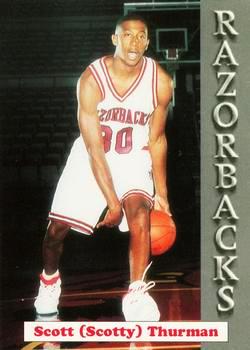
That was my first time experiencing that and it really caught me off guard. Obviously, when you’re being recruited, you’re being talked to really nice and then when you get there, you’re not good enough and you’ve got a lot of work to do. From a conditioning standpoint, it’s obviously different than high school. The pace, the type of talent you are around, the one on one drills, the box out drills, the one on one, two on two, the three on three, five on five and there is not a drop off in talent level, yet and still you’ve got this guy yelling and screaming and telling you what you should be doing and whether you are doing it correctly or not. For me that was the toughest part, getting used to the pace in every drill, timed water breaks, then back to the drill, was probably the biggest thing for me. This was work, not just playing the game. This was all business for Coach Richardson and he had a business approach. I have since adapted that to my everyday life, even in coaching. Certain things I learned from those moments that have really helped me.
David Jordan Jr: During that time the SEC was the premiere, if not the number one conference in the country. So many great teams, on any given night you had to bring it. What made that conference so great, because it was great coaches and great players on all teams. Some nights you might have somebody on a roster that you might not know of go off and lead a team to a victory over a top-ranked team.
Scotty Thurman: I think it was the type of recruiting that was being done by the coaches that were in place at that time. Coaches in the SEC were recruiting very athletic and skilled players or the ones that had a combination of the two. I thought the skill level for most of the guys was very high. At the time, the SEC was well known for football. However, when we played in the Final Four in 1994, Florida was in the Final Four as well. In my mind, the SEC was a powerhouse in basketball too.
We had some of the most athletically gifted people in the country playing in the SEC. Antonio McDyess. Erick Dampier. My freshman year, James “Hollywood” Robinson and Jason Caffey were at Alabama at the same time and Jamal Faulkner transferred in from Arizona State. They had Roy Rogers who played several years in the NBA, coming off the bench. That’s 3 guys from the same team that had NBA careers. Florida had Andrew DeClercq. Billy McCaffrey was at Vanderbilt. He transferred in from Duke. Ronnie McMahan was also at Vanderbilt. Ronnie Henderson and Randy Livingston were at LSU. Then we had Corliss, myself, Corey Beck, Clint McDaniel, and Dwight Stewart. There were a lot of guys on each team that could play. Then South Carolina, which wasn’t even talked about back then had Jamie Watson and Emmet Hall. Those guys were some good basketball players and athletic freaks. We were getting five to six teams in the NCAA each year.
David Jordan Jr: The players that came in like yourself that came in, were major contributors as freshmen.
Scotty Thurman: That goes to maturity. Nowadays, every kid wants to go to prep school, as though high schools coaches can’t coach. Not that I have an issue with prep schools, I think it’s good on some levels and I think it’s not good on some levels. Back when we played, no one was soliciting for anything. It was all based off of hard work and effort.
 It had nothing to do with how many Twitter followers you had or how many Instagram followers you had or how many times a certain video was posted. It was based off of production, people coming to see you, nobody telling you how good somebody is, you would actually see it yourself. With COVID, you have a lot people having to make decisions off videotape. You see kids on video and he’s listed at 6’8 but you see him in person and he’s actually 6’6.
It had nothing to do with how many Twitter followers you had or how many Instagram followers you had or how many times a certain video was posted. It was based off of production, people coming to see you, nobody telling you how good somebody is, you would actually see it yourself. With COVID, you have a lot people having to make decisions off videotape. You see kids on video and he’s listed at 6’8 but you see him in person and he’s actually 6’6.
David Jordan Jr: During your three years at Arkansas you all made two consecutive Final Fours, winning the NCAA Championship in 1994 and you made one of the biggest shots in the history of the NCAA Tournament. You all made it back in ’95 and you were runner up. What was the common thing that both teams had and what was the one thing that was different in the ’94 and ’95 teams that caused you all to finish the same way that you finished in 1994? I remember that first game of the season when you all played UMASS and I was not expecting you all to lose in the way that you did. What was the consistency in those two teams and the difference in those two teams?
Scotty Thurman: The consistency in those two teams, was that we still had the core group of guys from the 1994 team and for the most part we were all about winning. I think you had a collection of guys that had learned not to be caught up in their own individual stats and the press clippings and the hype that was associated with being the number one team in the country.

I think the thing that hurt us in 1995 was that I think certain people, (and I’m not singling anybody out) due to whatever factors that was going on with nineteen and twenty-year-old kids, our edge didn’t remain as sharp. We knew we were good, versus maybe still having that chip on our shoulder and having to still prove that we were good, if that makes sense. I think we wanted to prove it but I think we had eased up on our battle cry.”No one respected us, no one thought we were good enough.” Coming in my Freshman year, Todd Day, Lee
Mayberry, Oliver Miller were gone but they had finished the previous season in the post-season top ten, even though they lost to Memphis State in that 1992 NCAA tourney. By the time school started in the fall, we were preseason 46th. We were like “Damn,” we know we lost those guys but we had some returners but we still lacked the respect. Being ranked 46th in the preseason, becoming ranked in the top 15 by Christmas that Fall, losing to the NCAA Champion North Carolina, and all the way until I hit the shot and we won the title, the edge and chip remained. Then, everyone gets a day of their own in their respective hometowns. Scotty Thurman Day, Corliss Williamson day, etc. Certain guys get the keys to their cities and we had a parade, like no other, in Little Rock. I think due to certain influences, a little bit of immaturity, kids that were on the cover of Sports Illustrated, the edge somewhat went away, but even with that we still had a chance to repeat.
David Jordan Jr: What was the most important lesson you learned from Coach Richardson as a player and also what was the most important thing you learned from him in being a man during your time on campus?
Scotty Thurman: The most important thing I learned from him as a player is that you’re only as good as your last game. I think that’s where a lot of people fail. You may have thirty on Tuesday but on Friday it doesn’t matter. It’s a new game. You have to do it again. I’ve always kept that in my mind with my work attitude. Try to win every day. Try to be good every day. Don’t settle. Every day I’ve got to get up, I’ve got to grind. I’ve got to be productive every day, not somewhat productive, but VERY PRODUCTIVE. As a man, I think the biggest thing I learned is how to be unselfish, how to be accountable, and how to be someone that can be depended on; not just in athletics, but in life.
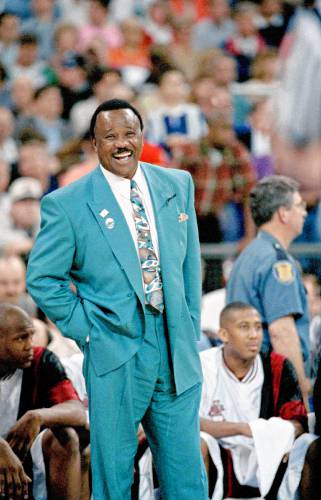
Being able to be counted on is something that goes unnoticed, especially amongst young kids, because they don’t even know what that looks like. The dependability, the accountability. We always had practice at 6:00 am, which I thought was one of the craziest things ever because I had never done that before. That really changed my
life altogether. Even now I wake up every morning prepared to go to work at 5:30-6:00 am no matter what, even if I don’t have to go anywhere. Working out or getting prepared for my day. He would always say, “while everybody else is sleep, we are getting better.”
David Jordan Jr: How much of his coaching style was talking about a life experience versus X’s and O’s? How many times was it teachable moments that he would apply something that he experienced during his life and use that in helping you all get better and see the ultimate goal.
Scotty Thurman: He talked about X’s and O’s more during the game and at times during practice. In order to prepare us for the games, he would always have an analogy from his background, something that he had gone through, something he had remembered from Coach Haskins (Coach Don Haskins, Texas Westerns And UTEP Head Basketball Coach, 1966 NCAA Champion, Coach Richardson played under him at Texas Western College for two years) that he didn’t understand at the time. If we lost a game, he would be able to come in and give us something that transpired in his life or when he competed and give it to us at that moment. He would explain how he went through it and how we would be able to bounce back.
He would ask us questions to see what our mental makeup was and to see how he could coach us. He was pretty smart in utilizing when to talk about basketball and when not to. He would always joke about how his wife was his point guard because she would always point out everything he did wrong. Whenever we went to his house we would not talk basketball. She wouldn’t let him. He would relax. Between those lines, he was the master motivator, the master at getting you ready to perform and keeping you on edge at all times and never feel like you’ve accomplished anything.
David Jordan Jr: It was evident in the teams. No matter who was in the game, there was never a drop in the intensity. Everybody came in with the same intensity and wanted to do it for not only for themselves but also for Coach Richardson.
Scotty Thurman: It was unbelievable. It was incredible to witness that. Most coaches, they come, they coach but a lot of them are not trying to get sweaty. He was walking up and down the floor, sweating, refereeing, and being as active as I’ve ever seen a college coach. He was up and down the sideline. During practice and after.
David Jordan Jr: Professionally you had a stint with the New Jersey Nets in the NBA and you also played internationally. How was that experience being able to see the world playing the game and playing in different countries that otherwise you may not have been to, but you had the opportunity to play there, live there and experience the culture?
Scotty Thurman: LIFE CHANGING. Living in other countries, experiencing different cultures, eating different foods, and in some cases having to learn different languages to be able to communicate effectively. Not having access to American television. Having to adjust in other ways and realizing how spoiled we really are as United States citizens. Some of the things we have access to are some of the things other countries don’t have access to. Being able to communicate with people who have different belief systems, people that definitely don’t look like you but being able to have and maintain relationships. Always being subjected to being the person that is a minority, not only on this side of the world but definitely on that side of the world. Having to adjust to that helped shape and mold me into the person that I am today. In terms of not being judgmental and thinking that you know someone based off of what you heard about their ethnicity or background. We’re all the same in many ways. When you’re the person, where everyone is watching your every move and having to adjust to that humbled me to a certain degree and made me think about what my ancestors, grandparents and great grandparents went through and talked about when I was really young but couldn’t understand. I had to live through some of that, obviously not in the same ways that those before me experienced but being looked at as being different can be uncomfortable.
David Jordan Jr: You had the opportunity to go back to Arkansas as an assistant under Coach Mike Anderson. What was it like being on the sideline as a coach somewhere where you had so much success and now you’re playing a different role on the highest level of college basketball and trying to bring back that success and help players understand what it takes to be a champion, to be a true student-athlete because not only were you All-SEC as a player, you were All-Academic SEC as well?
Scotty Thurman: It was really surreal. When I first went up there to, the initial role was a Director of Student Development. I accepted a position with John Pelphrey and when John got let go, Coach Anderson came on board and asked me to remain on board in that position. Fast forward three to four years, we had a rocky season and coach wanted to do something different with his coaching staff, so he gave me the opportunity to become assistant coach. If I had to go back fourteen to fifteen years previously, I never had the intention to coach. I kind of wanted to get away from basketball. After being pulled into volunteer when my son was in middle school, I gravitated towards mentoring kids, being around the game, and I eventually embraced it. Fast forward and I’m coaching at my alma mater.
It was definitely a good time and a great experience. We made the NCAA tournament twice and participated in the NIT. When Coach Musselman came, he wanted me to look at going back to the director position and for me personally, that didn’t make sense for me at the time in my career. For me it was time to go down a different path and do something different. I started to really enjoy coaching the game of basketball and mentoring the young men through the game. I cherish the opportunity to teach the game, while shaping lives.
David Jordan Jr: Now you’re coaching high school in Little Rock at Parkview High School. You’ve been able to be apart of the game on each level on both sides. What has been from your perspective, the biggest change in the game in how you have to somewhat coach and interact with the players and coach as opposed to thirty years ago with everything surrounding the game. AAU used to only be in the summer, summer camps and then the high school season. Now it’s changed so much.
Scotty Thurman: The temperament of the kids. I had this conversation with my wife about our sixteen year old daughter. Our kids are so different than what we were. What I’ve tried to do is adjust with the times and not go against the grain. At times we can be victims of being so old school. You wind up losing kids. What I try to do is connect with them on whatever level they are on.
If it’s on social media, I will find someone on social media that’s talking about positive things or sports in general and try to shoot them as much information as possible, so that we have other things to talk about when we are not talking about basketball. If they are a visual learner, I will send them clips of themselves, so that I can teach them and they can see themselves. If it’s a kid that only likes to communicate via text, I may have to have all out text conversations with them, so that I can get them to the point of having a face to face conversations with me. Something that I learned from coaching in college, I never really try to meet with them in my office; I feel that once they come to my office, it becomes an intense situation for them. If I meet them on campus, in the cafeteria, in the library or just walking the halls, it’s like the Baptist church, “reach them where they are.” Be a magnet for them. The difference with me and most high school coaches is that I’m not just concerned about wins and losses; I want to win every game but I don’t want them to get behind in their studies, I want to make sure there is not something going on at home that we can’t help them with or maybe get them some help with. I don’t want to be somebody that they feel is always on them about just basketball. Off the court I can communicate with you, laugh with you, joke with you, pray with you, cry with you, whatever the moment calls for.
David Jordan Jr: The coaching tree that has come from playing under Coach Richardson. Do you all have conversations about things that you all saw from coach?
Scotty Thurman: Corliss and I talk more than myself and Todd. I talk to Corliss or Lee Mayberry who is an assistant women’s coach at Oral Roberts. I still talk to coach TJ Cleveland. I still talk to Paul Pressley who played for Coach Richardson at Tulsa. Corliss is probably the biggest guy in terms of film study due to his time in the NBA. I’m probably second because of the level I was at in terms of coaching Arkansas. Plus, we play each other twice a year because we are in the same conference since he coaches at Little Rock Christian.
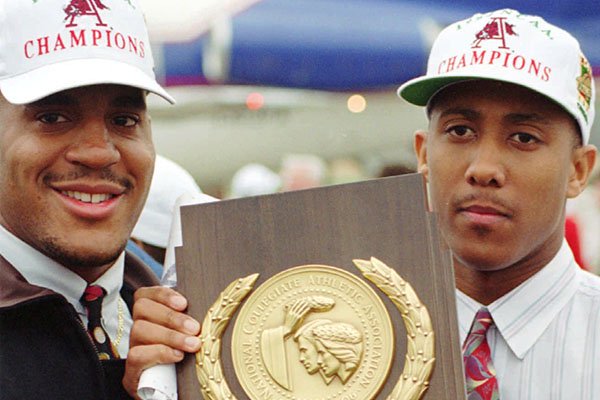 Todd is the one out of all of us that takes on Coach Richardson’s personality on the sideline in trying to push them the right way.
Todd is the one out of all of us that takes on Coach Richardson’s personality on the sideline in trying to push them the right way.
David Jordan Jr: What is the best piece of advice to you would have for anybody trying to attain success or if they are in the midst of a depth trying to get out. What is your philosophy?
Scotty Thurman: Stay true to who you are and your beliefs. Don’t allow outside influences to change the goals you’ve set for yourself. Remain positive and last but not least, remain prayerful because at the end of the day, we can have all of these plans but it’s only one person that controls everything. It’s a lot easier said than done but when you stay grounded and focused on the things that are important to you, it becomes easier to excel. You may not get to the top of the mountain but you’ll at least scratch the surface of it.

